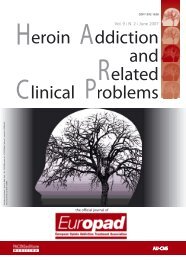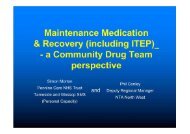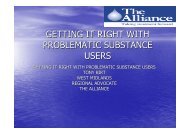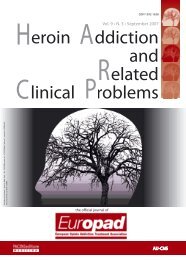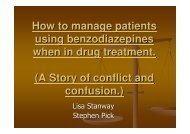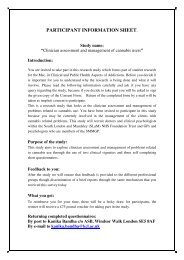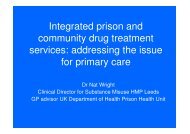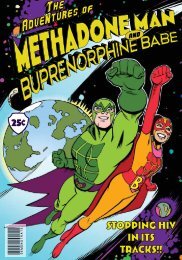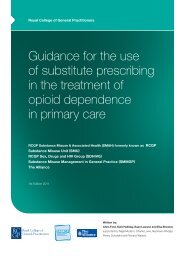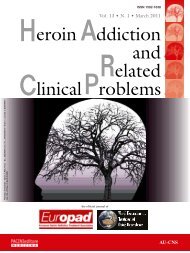cocaine guidance - Royal College of General Practitioners
cocaine guidance - Royal College of General Practitioners
cocaine guidance - Royal College of General Practitioners
- No tags were found...
Create successful ePaper yourself
Turn your PDF publications into a flip-book with our unique Google optimized e-Paper software.
9Guidance for working with <strong>cocaine</strong> and crack users in primary careSharing care outsidethe surgery<strong>General</strong> Practice is the port <strong>of</strong> entry for most drug andalcohol treatment. But most surgeries will not be able to<strong>of</strong>fer the full range <strong>of</strong> possible treatments. Therefore, itis crucial to know about the local relevant resources andwhere people can be referred on to quickly, while at thesame time avoiding any feeling in the patient that youare trying to get rid <strong>of</strong> them.There should be locally agreed integrated care pathwaysas well as a clear system <strong>of</strong> assessment and carecoordination. 7 It is important not to assess patientsrepetitively and excessively. All agencies in the area shouldbe using the same assessment tools and as patients arereferred to other agencies, their assessments shouldfollow them. This will prevent repetitive re-assessment.If you are continuing to work with a patient in partnershipwith other providers, be aware <strong>of</strong> the importance <strong>of</strong> clearcare coordination, providing the patient is happy andaware <strong>of</strong> confidentiality rules. Always ask users and localuser groups for help. National drug user groups can alsoprovide assistance to set up a local group, if there isn’tone already.It is becoming increasingly important to recognise thatmany drug users are using a combination <strong>of</strong> drugs ratherthan just opioids alone. Therefore if you are part <strong>of</strong> ashared care scheme, which is predominantly opioidfocused, you need to consider increasing the flexibility<strong>of</strong> the scheme to reflect current trends. How the newGMS contract will affect this remains to be seen.Care coordination can be difficult. If you need assistancein locating local services, have a look at the Helpfindersection <strong>of</strong> the DrugScope website:www.drugscope.org.uk/drugbaseii/home.aspFor shared care protocols, please see Appendix 5.Psychological interventionsThese are arguably the most useful <strong>of</strong> the treatments,but will for the most part be conducted outside <strong>of</strong> thesurgery. All psychological interventions are improved bya positive relationship with a key person, doctor, drugworker or therapist. This needs to be patient-centredand a strong empathic engagement with patients is thekey to success. Quality drug counselling can be at leastas effective as pr<strong>of</strong>essional psychotherapy. 8Cognitive Behaviour Therapy (CBT)CBT refers to a group <strong>of</strong> therapies that aim to reducedysfunctional emotions and behaviour by altering thinkingpatterns, based on the assumption that prior learningis currently having adverse consequences. The purpose<strong>of</strong> therapy is to reduce distress or unwanted behaviourby undoing this learning, or by providing new, moreadaptive learning. It has emerged in the USA researchas an important treatment method, and possibly thetreatment <strong>of</strong> choice for heavy <strong>cocaine</strong> users. 9 CBT needsto be provided by people who are trained and competentto provide it.In the treatment <strong>of</strong> people who use crack, cognitivebehavioural therapy can be used to change thinking(or facilitate cognitive change). This is brought about bya variety <strong>of</strong> possible interventions, including the practice<strong>of</strong> new behaviours, analysis <strong>of</strong> faulty thinking patterns,and the teaching <strong>of</strong> more adaptive self-talk.CBT can be provided in groups rather than individually,and in the US has been shown to provide the samebenefits. 8 The group can also act as social supportand an aftercare resource.Motivational Interviewing (MI)MI is an effective evidence-based approach forovercoming the ambivalence that keeps many peoplefrom making change in their lives. Its techniques areused to help move a person’s thinking through the‘change cycle.’ MI can be used to address life skills,stop/limit drug use, reduce harm and prevent relapse.Again it needs to be provided by people who are trainedand competent in this therapy, but can be a useful toolfor general practice.



